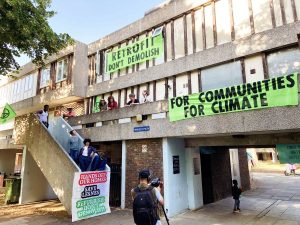Heavy rains have triggered building collapses that have killed dozens of people in northern Sudan since June. It comes as the country reels from almost 16 months of fighting between rival security forces and the UN has declared a famine in some parts.
Sudan: torrential rains kill nine people
A medic at a hospital in Abu Hamad, a small town in Sudan’s Nile state, some 400 kilometres (nearly 250 miles) north of Khartoum, told Agence France-Presse (AFP):
Nine people have died as a result of their houses collapsing. Many injured people continue to arrive at the hospital.
Each year in August, peak flow on the Nile is accompanied by heavy rains. These often destroy homes, wreck infrastructure, and claim lives, both directly and indirectly through water-borne diseases.
The impact is expected to be worse this year after more than a year of fighting that has pushed millions of displaced people into flood zones.
A witness in Abu Hamad told AFP:
Heavy rains caused most of the houses to collapse and all the shops in the market collapsed.
Last week, a flash flood caused the deaths of five people in Port Sudan, on the Red Sea coast. Aid groups have repeatedly warned that humanitarian access, already hampered by the war, will be made near-impossible in some areas as the rainy season hits.
Since June, rains have killed 32 people, injured over 100, and destroyed over 5,000 homes.
War and famine
Sudan faces what the United Nations has called the world’s worst humanitarian crisis in recent memory, as fighting between the army and the paramilitary Rapid Support Forces shows no sign of abating.
Some 10.5 million people have been forced from their homes, while the main battlegrounds teeter on the brink of all-out famine.
The war has already pushed the nearly half a million residents of the Zamzam camp outside the besieged Darfur city of El-Fasher into famine, a UN-backed assessment said last week. As the Canary previously reported, The Integrated Food Security Phase Classification (IPC) review, which is used by UN agencies, found that “famine is ongoing in July 2024 in Zamzam camp”. It said:
The main drivers of famine in Zamzam camp are conflict and lack of humanitarian access.
The World Food Programme (WFP) said:
UNICEF and the UN World Food Programme (WFP) have been warning of the escalating risk to the people of Sudan, particularly children, if urgent aid cannot be delivered to communities trapped in conflict hotspots like Darfur, Khartoum, Kordofan and Al Jazirah.
Now, with the rainy season upon Sudan, even more people are at risk.
Featured image supplied




